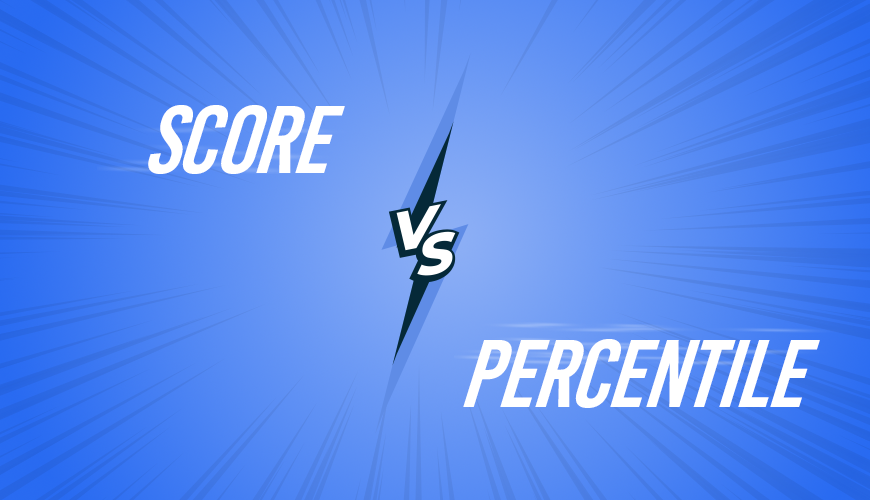Curious about GRE Percentiles?
If you’ve ever wondered how your GRE score stacks up against other test-takers or what percentile you need to get into your dream university, you’re not alone.
Percentiles play a crucial role in admissions, helping universities gauge your performance relative to others.
Whether you're targeting a top-20 school or a specific program, understanding required GRE percentiles is key to setting the right goals.
Sounds like a big deal?
Don’t worry- we’ve got you covered with everything you need in this blog.


GRE percentiles help you assess how your performance compares to that of other test takers. Each GRE score corresponds to a percentile, which indicates the percentage of candidates who scored lower than you. For example, if you are in the 90th percentile, it means you scored higher than 90% of the test-takers.
Percentiles are determined based on the scores of all test takers over a set period, usually by ETS (Educational Testing Service). Understanding percentiles is crucial, as they give insight into your relative standing and can help you gauge your competitiveness for admissions.

Your GRE score alone doesn’t tell the full story. Your percentile is what determines how you compare to other test-takers.
But how exactly is this percentile calculated?
Let’s break it down step by step.

When you take the GRE, your raw score isn’t used directly. Instead, it’s converted into a scaled score to ensure fairness across different test versions.
Since different test versions may have varying difficulty levels, ETS (Educational Testing Service) adjusts scores so they remain comparable across different test dates. This way, whether you took an easier or harder version of the GRE, your scaled score reflects your true ability.
But a scaled score alone isn’t enough to tell you how competitive you are. That's where percentiles come in.

ETS uses a rolling 3-year system to calculate percentiles. Instead of comparing your score to just the people who took the GRE the same year as you, your performance is ranked against all test-takers from the past three years.
For example, a 160 in Quant might place you in the 75th percentile this year but could shift slightly next year based on how future test-takers perform.

Your percentile rank tells you how your score compares to others:
Since universities use percentiles to compare applicants, understanding them helps you set a target score that aligns with your dream program’s requirements.
Table: GRE Verbal Reasoning and Quantitative Reasoning Interpretative Data Used on Score Reports (Percent of test takers scoring lower than selected scaled scores. Based on the performance of all individuals who tested between July 1, 2020, and June 30, 2023a)
Table: GRE Analytical Writing Interpretative Data Used on Score Reports (Percent of test takers scoring lower than selected score. Based on the performance of all individuals who tested between July 1, 2020, and June 30, 2023a)
Note for Tables: Blank cells imply that percentile information was not reported because there were no test takers above or below specified scale score range.
Source link: https://www.ets.org/pdfs/gre/gre-guide-table-1a.pdf
Now that you understand the relationship between GRE scores and percentiles, let’s explore why they matter and how setting a target percentile can help you optimize your GRE preparation effectively.

Setting a target percentile is crucial for securing admission to your desired university and program. Different universities and disciplines have varying percentile expectations. For example, top 20 universities often require a 90th percentile or higher in both verbal and Quantitative sections, whereas a top 50 university may accept a lower percentile.
Understanding percentile benchmark will help you to:
By setting a realistic yet ambitious target percentile, you can approach the GRE with a clear plan and maximize your chances of admission.

Now that we’ve covered GRE scores and percentiles, let’s dive into how different universities value these scores based on their programs.
A high Verbal Reasoning score is especially important for programs in humanities, social sciences, and business. Universities with strong programs in law, journalism, literature, philosophy, and political science place significant weight on Verbal scores. Many Ivy League institutions and other top-tier universities emphasize Verbal Reasoning, as it reflects analytical reading and critical thinking skills, both crucial for these fields.
A strong Quantitative Reasoning score is essential for STEM fields such as engineering, computer science, mathematics, and economics. Research-intensive and technical programs, especially at top 20 universities expect high Quant scores. A competitive Quant percentile demonstrates numerical analysis and problem-solving skills, which are critical for success in quantitative disciplines.
The importance of Verbal vs. Quant depends entirely on your target university and program:

Selecting the right university is a crucial step in your GRE journey, and EverTutor’s UniSuggest feature makes this process simpler, saving you valuable time and effort. Whether you're unsure about which schools match your profile or you want to maximize your admissions chances, UniSuggest offers personalized university recommendations based on your GRE scores and academic background.
Why Use UniSuggest?
Unlimited University Suggestions
With the $20 plan, you can generate unlimited university suggestions. This gives you the flexibility to explore multiple options and find the best fit for your future.
Understanding GRE percentiles is essential for setting realistic goals and enhancing your admissions chances. By leveraging tools like EverTutor’s UniSuggest, you can make informed decisions about university applications and maximize your chances of success. Start preparing with a clear strategy, set a target percentile, and take advantage of personalized university recommendations to achieve your dream academic journey.
A good GRE percentile depends on your target university and program. Generally:
STEM programs prioritize high Quant scores, while humanities/social sciences focus more on Verbal. Setting a percentile goal aligned with your program’s expectations is key to a successful application.
The raw score on the GRE represents the number of questions you answered correctly in the Verbal or Quantitative sections. However, because differe bnt test versions may have varying difficulty levels, ETS converts this raw score into a scaled score using a statistical process called equating. This ensures fairness across different test administrations. The scaled scores range from 130 to 170 in 1-point increments for Verbal and Quant, and from 0 to 6 in half-point increments for Analytical Writing. Since the scaled score alone doesn't indicate how you compare to other test-takers, ETS also provides a percentile rank, which shows the percentage of test-takers who scored lower than you, helping universities assess your relative performance.
A 75th percentile on the GRE means you scored higher than 75% of test-takers, making you a competitive candidate for many programs. Based on recent GRE data, a 75th percentile score translates roughly to a 157-158 in Verbal Reasoning and 161-162 in Quantitative Reasoning.
A 'good' GRE score really depends on your target schools and programs. The GRE is scored on a scale of 130-170 for both Verbal and Quantitative sections, and 0-6 for Analytical Writing.
Here's a general breakdown:
✅ 1000+ Practice Questions with Step -by-Step AI Walkthroughs.
✅ Vocabulary Trainer for the most essential GRE words.
✅ 24/7 Real-Time Doubt Solving with an AI Tutor.
✅ 5 Full-Length GRE Mock Tests with instant AWA scoring.